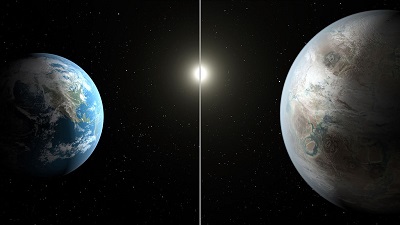With the discovery of the earth like planet Kepler-452b, we have the opportunity for a valuable object lesson. Contrary to what scientists are hoping for – this will not be a lesson to Creationists that evolution is true and extra-terrestrial life has been found, thus validating evolution. No, the lesson this discovery affords is a demonstration of the foolishness of trying to disprove anything (much less the Bible) when:
1. Your primary evidence has yet to be discovered; and
2. You’re arguing from a scientific theory that flies in the face of the established laws of science.
The object for today’s lesson will be Jeff Schweitzer’s article in the Huffington Post, “Earth 2.0: Bad News for God“. Schweitzer makes a number of mistakes common to scientists and others trying to debunk the Genesis account of origins. We’ll use his mistakes to identify these common errors so 1. You’re aware these are not unique earth shattering questions, they’ve all been handled before, and 2. You can more easily identify them, and respond appropriately when next you see them. We’ll look first at the problem with his whole approach and in the process answer his objections. Schweitzer believes he has mounted a serious challenge to the Genesis account. He’s seriously mistaken.
1. Lack of Objectivity
Most people believe scientists are objective, impartial promoters of the truth – whatever the truth turns out to be – because that is the image scientists have projected since the dawn of the modern scientific age. That couldn’t be further from the truth. Exhibit one: an example of a scientists who is biased and has obvious preferences as to what the truth is: Schweitzer himself. Schweitzer can’t hide his obvious glee at the mere prospect of proving Bible believers wrong.
I would like here to preempt what will certainly be a re-write of history on the part of the world’s major religions. I predict with great confidence that all will come out and say such a discovery is completely consistent with religious teachings.1
“Preempt” the world’s religions? In other words he anticipates the world’s religions being wrong, and he wants to afford them no wiggle room to claim they were not, and thus this “preemptive” strike. An attempt to box them in; and to create the strongest case to say “see you’re wrong, and I told you so.” Hardly an objective position for a scientist. But Creationists and Intelligent Design theorists have been saying that the average scientist is neither objective nor unbiased for a long time. Creationist Ken Ham has been making this point for over a quarter century:
Many think of scientists as unbiased people in white laboratory coats objectively searching for truth. However scientists come in two basic forms, male and female, and they are just like you and me. They have beliefs and biases. A bias determines what you do with the evidence, especially the way in which you decide that certain evidence is more relevant or important than other evidence.2
One’s bias is of critical importance because it determines not only what evidence will be accepted3 but also the a-priori assumptions use in interpreting the evidence. For instance some look at the Grand Canyon and see a little bit of water acting over a long period of time (millions of years). Others see a lot of water (as in a world wide flood) acting over a short period of time. Same evidence, but a-priori assumptions determine how the evidence is interpreted. Clearly such assumptions are critical to one’s approach to both science and life.
2. Incorrect a-priori assumptions
Schweitzer is convinced that life exists out there in the universe, and one day we’ll discover it:
As I stated at the beginning, none of this will matter upon life’s discovery elsewhere.4
I make the case in the Waning, Great Scientific Hope that the search for life on other planets is a hopeless one, with no chance of success. Why does Schweitzer consider it a certainty, and one day we’ll discover it? It’s based on his a-priori assumptions. Most scientists are naturalists – meaning they will allow only natural causes as scientific explanation. This forces them to adopt an anti-God, pro-Big Bang, pro-evolutionary world view which assumes: Continue Reading

